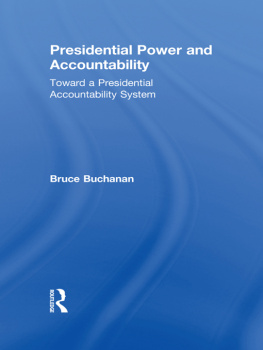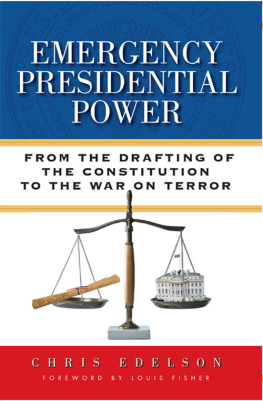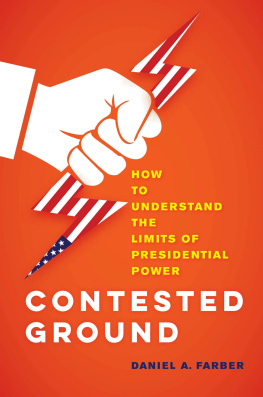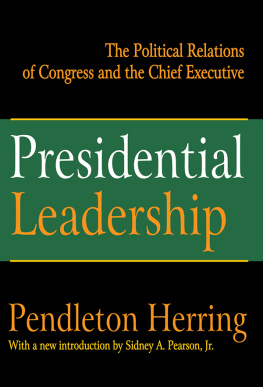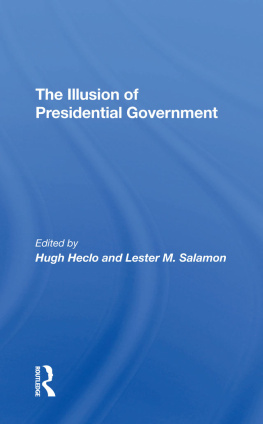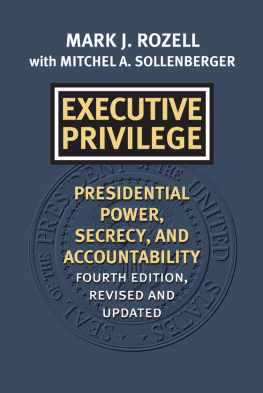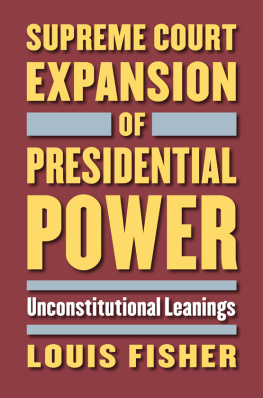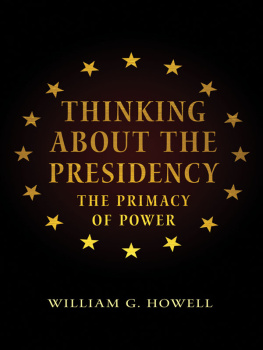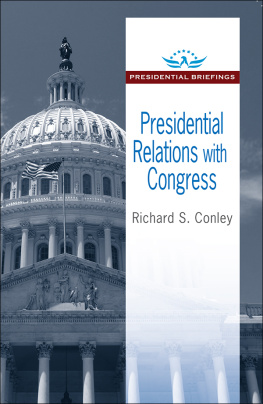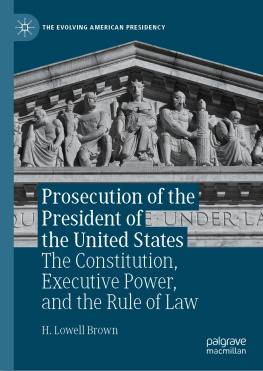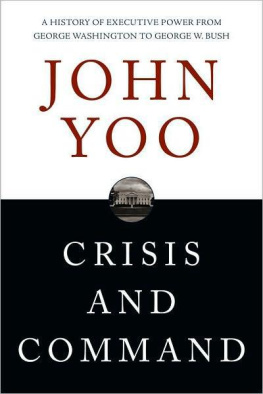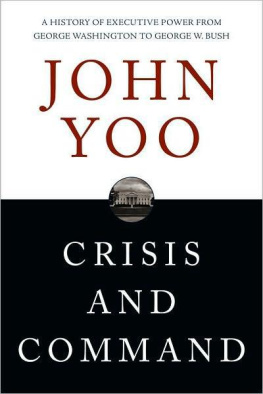PRESIDENTIAL POWER AND
ACCOUNTABILITY
Many analysts now believe that the growth of presidential war power relative to Congress is irreversible. This book was written to contest that view. Its purpose is to identify what would be required to restore presidential war power to constitutional specifications while leaving the president powerful enough to do what is truly necessary in the face of any emergency. Buchanan focuses mainly on diagnosing the origins of the problem and devising practical ways to work toward restoration of the constitutional balance of power between Congress and the president.
The work begins by showing the lack of clear, widely shared standards whose enforcement is needed to sustain the balance of power and draws on the thinking of the founders and political theorists to crystallize such standards. Next it details how, in the absence of standards, agents such as Congress and the Supreme Court with formal influence on presidents and informal agents such as media and public opinion have unwittingly enabled unnecessary power expansion, such as the presidential wars of choice.
Of course, change of this magnitude cannot be expected to happen quickly. Remedies necessarily involve a reform architecture intended to unfold gradually, with the first step being simply to start a focused conversation (another purpose of this book). Buchanan moves toward specific remedies by identifying the structure and strategy for a new think tank designed to nudge the political system toward the kind of change the book recommends. Lastly, the book shows how a fictional policy trial could take a practical step toward rebalancing the war power.
This is a crucial examination of presidential power and the U.S. separation of powers system, with a focused effort on making a course correction toward the kind of power sharing envisioned in the Constitution.
Bruce Buchanan is a professor in the Department of Government at The University of Texas at Austin. He is a scholar of the presidency and a political analyst whose commentary on the presidency and American politics appears in national and international print and broadcast news media. He is the author of numerous books on the presidency concerning how to make the institution both more effective and more democratic.
PRESIDENTIAL POWER
AND ACCOUNTABILITY
Toward a Presidential
Accountability System
Bruce Buchanan
First published 2013
by Routledge
711 Third Avenue, New York, NY 10017
Simultaneously published in the UK
by Routledge
2 Park Square, Milton Park, Abingdon, Oxon OX14 4RN
Routledge is an imprint of the Taylor & Francis Group, an informa business
2013 Taylor & Francis
The right of Bruce Buchanan to be identified as author of this work has been asserted by him in accordance with sections 77 and 78 of the Copyright, Designs and Patents Act 1988.
All rights reserved. No part of this book may be reprinted or reproduced or utilized in any form or by any electronic, mechanical, or other means, now known or hereafter invented, including photocopying and recording, or in any information storage or retrieval system, without permission in writing from the publishers.
Trademark notice: Product or corporate names may be trademarks or registered trademarks, and are used only for identification and explanation without intent to infringe.
Library of Congress Cataloging in Publication Data
Buchanan, Bruce, 1945
Presidential power and accountability : toward a presidential accountability system / Bruce Buchanan.
p. cm.
Includes bibliographical references.
1. Presidents--United States. 2. Executive power--United States. 3. Separation of powers--United States. 4. War and emergency powers--United States. 5. Government accountability--United States. I. Title.
JK516.B77 2012
352.2350973--dc23
2012006003
ISBN: 978-0-415-53654-7 (hbk)
ISBN: 978-0-415-53655-4 (pbk)
ISBN: 978-0-203-11135-2 (ebk)
LIST OF TABLES AND FIGURE
Tables
Figure
1
INTRODUCTION
Rethinking Presidential Power
Although the Constitution is mentioned often, this book is not intended as a treatise in constitutional law. Instead, it offers new ways to think about an increasingly pressing problem: the erosion of presidential accountability for the use of power. In the process it re-evaluates the workings of the separation of powers and of checks and balances and proposes concrete remedial action. How to fix it is not the usual focus of books in the broad subject area of presidential power, but it is the focus here. Given this fact, the book is addressed not just to political scientists and constitutional scholars but to any citizenwhether expert or noviceseriously concerned with the growing imbalance in the separation of powers.
Many now believe that the enlargement of the presidency relative to Congress is irreversible, particularly on matters touching the main concern in this book, which is the war power (Deering, 2005). That pessimistic view is contested here. Without question, new proposals like those introduced below and described in detail in
Political thinkers as diverse as John Locke and Abraham Lincoln usefully remind us of what has been missed due to lack of reflection on the corrective potentials of our separation of powers design. Unfortunately, these still useful reminders are and in still greater detail in the third chapter). As a result, we have failed to keep the presidency in check at key momentsparticularly before the initiation by presidents of major wars that were optional rather than necessary .
The problem has its origins in the nature of presidential responsibility. Because events have forced presidents since George Washington to manage crises and solve unexpected problems, presidential power has grown beyond the intent of the framers. The reason is that new assertions of power have been treated as permanently enlarging precedents. This practice has driven executive power, ratchet-like, in but one direction: upwardto a point where presidents now feel entitled to decide for themselves whether and when to use military power. To be sure, the presidency must be sufficient unto any need, if it is to meet its unique responsibility for protecting the American political system. But presidential power has expanded beyond mere sufficiency to a point that requires rethinking with the intent to calibrate. That is the purpose of this book.
Calibration
To calibrate something is to gauge its deviation from a standard in order to ascertain the proper correction factors. This may seem unrealistically precise, too scientific as an approach to regulating something as emotionally and politically charged as the use of presidential power in real or imagined crises. Yet clear guidance is both needed and available. The standard used here for pinpointing the proper scope of presidential power was suggested by President Lincoln. It involves a dynamic relationship between the idea of necessity for presidential action in the face of threat and the constraints of the Constitution. The constitutional limits on presidential discretion may be set aside when emergencies make it necessary. But power so expanded should not be allowed to become permanent through precedent. It must instead snap back, like a stretched rubber band, to its original constitutional shape once the crisis has passed. This, in Lincolns view, is the essential correction factor because it preserves the constitutional order. It is the standard that underlies the argument to follow.

